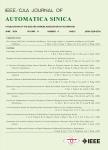A Composite State Convergence Scheme for Bilateral Teleoperation Systems
A Composite State Convergence Scheme for Bilateral Teleoperation Systems作者机构:the Department of Electrical &Computer EngineeringDalhousie UniversityN.S.Canada the Department of Electrical & Computer EngineeringDalhousie UniversityN.S.Canada the Department of Electrical EngineeringUniversity of the Punjab LahorePakistan the Department of Electrical EngineeringThe University of LahorePakistan the Department of Biomedical EngineeringDalian University of TechnologyChina the Department of Automatics &Applied Software“Aurel Vlaicu” University of AradRomania
出 版 物:《IEEE/CAA Journal of Automatica Sinica》 (自动化学报(英文版))
年 卷 期:2019年第6卷第5期
页 面:1166-1178页
核心收录:
学科分类:12[管理学] 1201[管理学-管理科学与工程(可授管理学、工学学位)] 08[工学]
基 金:supported by the Natural Sciences and Engineering Research Council of Canada(NSERC)
主 题:Composite variables linear control systems state convergence teleoperation time delay
摘 要:State convergence is a novel control algorithm for bilateral teleoperation of robotic systems. First, it models the teleoperation system on state space and considers all the possible interactions between the master and slave systems. Second, it presents an elegant design procedure which requires a set of equations to be solved in order to compute the control gains of the bilateral loop. These design conditions are obtained by turning the master-slave error into an autonomous system and imposing the desired dynamic behavior of the teleoperation system. Resultantly, the convergence of master and slave states is achieved in a well-defined manner. The present study aims at achieving a similar convergence behavior offered by state convergence controller while reducing the number of variables sent across the communication channel. The proposal suggests transmitting composite master and slave variables instead of full master and slave states while keeping the operator s force channel intact. We show that,with these composite and force variables;it is indeed possible to achieve the convergence of states in a desired way by strictly following the method of state convergence. The proposal leads to a reduced complexity state convergence algorithm which is termed as composite state convergence controller. In order to validate the proposed scheme in the absence and presence of communication time delays, MATLAB simulations and semi-real time experiments are performed on a single degree-of-freedom teleoperation system.



